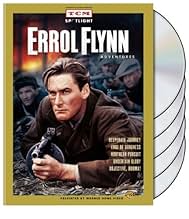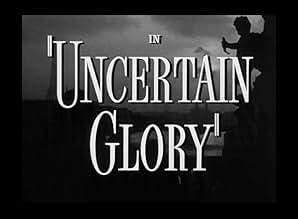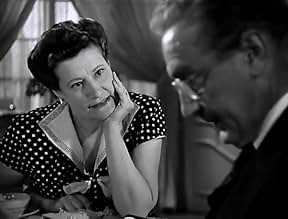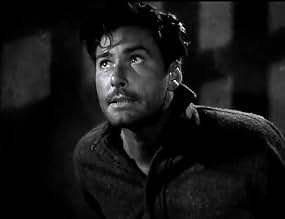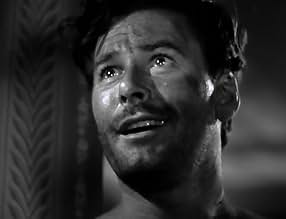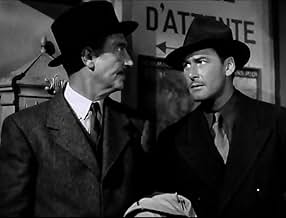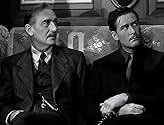AVALIAÇÃO DA IMDb
7,1/10
1,6 mil
SUA AVALIAÇÃO
Adicionar um enredo no seu idiomaAfter a career criminal is recaptured and knows he faces the guillotine, he offers to exchange his life for 100 hostages slated for execution by the Germans.After a career criminal is recaptured and knows he faces the guillotine, he offers to exchange his life for 100 hostages slated for execution by the Germans.After a career criminal is recaptured and knows he faces the guillotine, he offers to exchange his life for 100 hostages slated for execution by the Germans.
- Direção
- Roteiristas
- Artistas
Douglass Dumbrille
- Police Commissioner LaFarge
- (as Douglas Dumbrille)
Felix Basch
- Gestapo Major
- (não creditado)
Frederic Brunn
- German Soldier Reporting to Major
- (não creditado)
Nora Bush
- Townswoman
- (não creditado)
James Carlisle
- Townsman
- (não creditado)
Wallis Clark
- Razeau
- (não creditado)
Pedro de Cordoba
- Executioner
- (não creditado)
Fred Cordova
- Execution Guard
- (não creditado)
Avaliações em destaque
Errol Flynn is headed for "Uncertain Glory" in this 1944 film also starring Paul Lukas, Faye Emerson, Lucille Watson, Sheldon Leonard, and Jean Sullivan. The premise is similar to 1943's "Hangmen Also Die!" in one way - the Nazis have taken hostages who will die unless a saboteur is found. In this case, it's the saboteur who blew up a French bridge and killed Germans. Nazis have taken many men as hostages from a small nearby village. Parallel to this, an Inspector Bonet (Lukas) has finally tracked down a fugitive convicted of murder, Jean Picard (Flynn) who has slipped through France's fingers time and time again - the last time, just as he was about to get the guillotine, the site was bombed, and he escaped. A friend (Leonard) puts Bonet on his trail, and he's eventually caught. En route to another bout with the guillotine, Picard suggests that he'd rather die by firing squad - can't the Inspector say he is the saboteur, save the 100 men, and Picard can still meet his death? After some thought, Bonet agrees. Giving out a report of Picard's death, the name Dupont is given to Picard, someone on whom the Nazis cannot check. The real saboteur, whom they help escape, gives them the critical details - one especially important one - to tell the Nazis.
Raoul Walsh directed this film, which is sluggish at times and obviously just cranked out by Warners - probably one of those ones where Jack Warner whined to Walsh, you have to direct this movie for me. Walsh: Who's in it? Warner: Oh, I don't know. Just do it. According to Walsh, this type of thing went on all the time. It's actually a good story that with a little more in the way of production values could have been excellent.
Paul Lukas is wonderful as a gruff, honest inspector whose patriotism overcomes his honesty and who has bonded with this criminal in spite of himself even though he doesn't trust him and doesn't like him. Flynn does very well in his part - despite Jean's earnest sincerity, you know he wants nothing more than to get away from Bonet as soon as possible, and this whole thing is an elaborate ploy. But he has Bonet half-believing him. Lucille Watson plays a tough woman whose son is one of the hostages and who goes against the village priest to frame someone as the saboteur so her son can be freed.
One of the comments on this site complained about the French people speaking English. I repeat the theatrical rule: when citizens of a country are depicted in their country in a film or play, they would be speaking their own language, not English with a French accent. Therefore, no accent is necessary, Lucille Watson in this movie being the purest example of this. Flynn and Lucas have accents, of course - one just has to pretend they came from different parts of France.
All in all, the two stars make the film worthwhile.
Raoul Walsh directed this film, which is sluggish at times and obviously just cranked out by Warners - probably one of those ones where Jack Warner whined to Walsh, you have to direct this movie for me. Walsh: Who's in it? Warner: Oh, I don't know. Just do it. According to Walsh, this type of thing went on all the time. It's actually a good story that with a little more in the way of production values could have been excellent.
Paul Lukas is wonderful as a gruff, honest inspector whose patriotism overcomes his honesty and who has bonded with this criminal in spite of himself even though he doesn't trust him and doesn't like him. Flynn does very well in his part - despite Jean's earnest sincerity, you know he wants nothing more than to get away from Bonet as soon as possible, and this whole thing is an elaborate ploy. But he has Bonet half-believing him. Lucille Watson plays a tough woman whose son is one of the hostages and who goes against the village priest to frame someone as the saboteur so her son can be freed.
One of the comments on this site complained about the French people speaking English. I repeat the theatrical rule: when citizens of a country are depicted in their country in a film or play, they would be speaking their own language, not English with a French accent. Therefore, no accent is necessary, Lucille Watson in this movie being the purest example of this. Flynn and Lucas have accents, of course - one just has to pretend they came from different parts of France.
All in all, the two stars make the film worthwhile.
Right after Flynn's rape trial Warner put him in "quickie" inexpensive films not knowing how the public would respond to Flynn films. Uncertain Glory was one of them. Most reviewers of the time panned the film as a minor Flynn vehicle and heroic Flynn nonsense. However, as time has passed some modern day reviewers have re-evaluted this film and some have commented that Flynn gives a really good performance in a pretty darn good cat and mouse drama. And I totally agree. The story is interesting and the interplay between Flynn and Oscar-winning(The Watch on the Rhine) Paul Lukas is terrific. I think this is maybe Flynn's most underrated film. Whenever I watch it I imagine by Flynn's character the ending could have gone quite different and been more unpredictable but knowing the times(1944) and still in the midst of WWII the ending had to be what it was... Patriotic. Again, I think "Uncertain Glory" is a very underrated Flynn movie. *** of **** rating...easy.
Uncertain Gory is a thoughtful, well-made war/intrigue thriller staring Errol Flynn and Paul Lukas. Flynn, whose acting skill was oft unfairly derided as suitable only for swashbuckling, athletic roles, could have easily let himself be overshadowed by Lukas, a high-class dominant character actor known for his acerbic, psychological portrayals. In fact Flynn seems to have been inspired by his co-star and turns in what may have been the best acting job of his career.
While Flynn usually played the dashing hero, and Lukas was often cast in sinister roles, here the roles are reversed. Lukas portrays an upright police inspector escorting scummy lifelong criminal and convicted murderer Flynn through Nazi-occupied France to face the guillotine. As the Germans are preparing to execute a hundred French hostages unless the saboteur who blew up a bridge with a German troop train on it surrenders himself, Flynn suggests he could end his misspent life with a noble gesture by claiming to be the saboteur. He would rather be executed by firing squad anyway, he avers, than face the awful prospect of beheading. Against his better judgment, the inspector agrees. The complications and suspense hereafter hinge on whether consummate conman Flynn is sincere, or is he working the con of his life -- for his life. The ensuing cat-and-mouse game between the wily criminal and the determined, suspicious policeman provides an entertaining, suspenseful story and a pair of brilliantly realized character studies by Flynn and Lukas. Along the way, the criminal picks up the help of a naive, provincial shop girl, Jean Sullivan, a pretty, lithesome flamenco dancer, brilliantly cast in her introductory movie roll. Part of the suspense turns on whether Flynn actually loves the girl or is just using her.
Director Raoul Walsh has cinematographer Sid Hickox use many closeups to catch every nuance of facial expression in constructing deeply psychological and spiritual character studies. As in all Warner Brothers pictures of this era, the marvelous supporting cast sports many familiar and expressive faces. Lucille Watson plays her usual nasty matron as the bitter, manipulative mother of one of the hostages. Faye Emerson sizzles as one of Flynn' hard-bitten molls in the early going. James Flavin, almost unrecognizable in a black mustache and an Adrian helmet, turns in his typical stolid, authoritarian presence in a typically thankless roll as a harried militia captain feverishly searching for the saboteur. But Dennis Hoy is absolutely riveting as the parish priest. He is like Moses come down from the mountain as he roundly denounces as sinful and demoniacally inspired the plans of Watson and confederates to free their loved ones by fingering and innocent man as the saboteur. He is more quietly moving as he asks his congregation to kneel and beg God's forgiveness for their sins and the sins of their country which have caused them to be delivered into the hands of the enemy they hate.
Herein is the aspect of this picture different from what one sees throughout most of the classic movie era or any other time. Characters routinely pray and invoke the help of God, and there is much philosophical talk of God. Though ridiculing and joking at the time, Flynn's decadent thief is seen to be visibly moved as he watches tough cop Lukas kneel to pray in the church they have entered to avoid the Nazis and their Vichy militia toadies. We never know what Lukas is praying for -- his family in Paris? the success of their perilous scheme? forgiveness of his sins? -- but we are moved. At least those of us who are Christians are. Likewise as the escaped Flynn watches old people praying in a farm yard for the deliverance of the hostages and his innocent girlfriend lighting a candle for the same blessing. Such scenes were seldom seen in the l930's or the later 1940's. Hollywood was happy to forget God most of the time. Most of the rest of us are, too, until we start having troubles. World War II was a time of deep, deep, dark, dark troubles for the whole world. So Hollywood, like everyone else, except perhaps the most die-hard of commies, was remembering God. As soon as the war was over, and brighter times returned, God was promptly forgotten again.
Those hoping for a rat-a-tat-tat war action movie will be disappointed by Uncertain Glory. There is little action, though much suspense. This is more of a thinking person's Errol Flynn picture. It may be too philosophical and too Christian for some, but it should be rewarding in any case for the intense, psychological character studies by Flynn, Lukas, and the sterling supporting cast. A fine moral-boosting World War II piece, and top grade Old Hollywood entertainment from "the best of times and the worst of times."
While Flynn usually played the dashing hero, and Lukas was often cast in sinister roles, here the roles are reversed. Lukas portrays an upright police inspector escorting scummy lifelong criminal and convicted murderer Flynn through Nazi-occupied France to face the guillotine. As the Germans are preparing to execute a hundred French hostages unless the saboteur who blew up a bridge with a German troop train on it surrenders himself, Flynn suggests he could end his misspent life with a noble gesture by claiming to be the saboteur. He would rather be executed by firing squad anyway, he avers, than face the awful prospect of beheading. Against his better judgment, the inspector agrees. The complications and suspense hereafter hinge on whether consummate conman Flynn is sincere, or is he working the con of his life -- for his life. The ensuing cat-and-mouse game between the wily criminal and the determined, suspicious policeman provides an entertaining, suspenseful story and a pair of brilliantly realized character studies by Flynn and Lukas. Along the way, the criminal picks up the help of a naive, provincial shop girl, Jean Sullivan, a pretty, lithesome flamenco dancer, brilliantly cast in her introductory movie roll. Part of the suspense turns on whether Flynn actually loves the girl or is just using her.
Director Raoul Walsh has cinematographer Sid Hickox use many closeups to catch every nuance of facial expression in constructing deeply psychological and spiritual character studies. As in all Warner Brothers pictures of this era, the marvelous supporting cast sports many familiar and expressive faces. Lucille Watson plays her usual nasty matron as the bitter, manipulative mother of one of the hostages. Faye Emerson sizzles as one of Flynn' hard-bitten molls in the early going. James Flavin, almost unrecognizable in a black mustache and an Adrian helmet, turns in his typical stolid, authoritarian presence in a typically thankless roll as a harried militia captain feverishly searching for the saboteur. But Dennis Hoy is absolutely riveting as the parish priest. He is like Moses come down from the mountain as he roundly denounces as sinful and demoniacally inspired the plans of Watson and confederates to free their loved ones by fingering and innocent man as the saboteur. He is more quietly moving as he asks his congregation to kneel and beg God's forgiveness for their sins and the sins of their country which have caused them to be delivered into the hands of the enemy they hate.
Herein is the aspect of this picture different from what one sees throughout most of the classic movie era or any other time. Characters routinely pray and invoke the help of God, and there is much philosophical talk of God. Though ridiculing and joking at the time, Flynn's decadent thief is seen to be visibly moved as he watches tough cop Lukas kneel to pray in the church they have entered to avoid the Nazis and their Vichy militia toadies. We never know what Lukas is praying for -- his family in Paris? the success of their perilous scheme? forgiveness of his sins? -- but we are moved. At least those of us who are Christians are. Likewise as the escaped Flynn watches old people praying in a farm yard for the deliverance of the hostages and his innocent girlfriend lighting a candle for the same blessing. Such scenes were seldom seen in the l930's or the later 1940's. Hollywood was happy to forget God most of the time. Most of the rest of us are, too, until we start having troubles. World War II was a time of deep, deep, dark, dark troubles for the whole world. So Hollywood, like everyone else, except perhaps the most die-hard of commies, was remembering God. As soon as the war was over, and brighter times returned, God was promptly forgotten again.
Those hoping for a rat-a-tat-tat war action movie will be disappointed by Uncertain Glory. There is little action, though much suspense. This is more of a thinking person's Errol Flynn picture. It may be too philosophical and too Christian for some, but it should be rewarding in any case for the intense, psychological character studies by Flynn, Lukas, and the sterling supporting cast. A fine moral-boosting World War II piece, and top grade Old Hollywood entertainment from "the best of times and the worst of times."
Uncertain Glory (1944)
A rather good war drama, a bit pre-packaged but very well done, as pretty much all Warner Bros films were from this era. Errol Flynn was at a point in his career when he wanted to become a "leading man" in the broader sense, not just a sword-fighting (and handsome) daredevil.
Key to the movie is the quasi-propaganda quality of the movie, set and made during World War II. That's not a bad thing—it's not government propaganda at all, but simply rooting for the good guys, and putting the French (our allies) in a good light (which they deserve).
The plot twist is simple and comes out early, so this gives nothing away—Flynn is a petty criminal who killed someone in a moment of panic, almost by accident, and he's about to have his head chopped off. But then an opportunity (dramatically and beautifully done) suggests a different way to die: for the Cause. The question is whether he can follow through, or whether he'll follow his new romantic (and idealized) love interest to a free new life.
It's all rather good even if contained in movie expectations. The police detective who is guarding and helping Flynn's character is a stalwart of the period, Paul Lukas, and he adds a needed level of gravity and even complexity to the interactions. Flynn is a cheerful presence—very American (even though he's from Tasmania!)—but he often responds rather than leads his scenes. The third lead is the woman, played with wonderful honesty by Faye Emerson.
Part of enjoying these WWII movies is knowing their context, and getting how the audience was wild for a sense of the war, of knowing who was winning, and of sensing how the scene worked, what the French were really like, what the chances were for a soldier caught up in it all. Their brother, their son. And that's kind of what this movie is about, showing heroism, and goodness, and how the war is a just cause and the Nazis are truly horrible (they were). Flynn does what he needs to do here, and if there is artifice and some lack of total believability, that's almost necessary so that a safe distance and cushion is in place.
Not an essential movie, but a really good one, especially if you already like this kind of film and this era.
A rather good war drama, a bit pre-packaged but very well done, as pretty much all Warner Bros films were from this era. Errol Flynn was at a point in his career when he wanted to become a "leading man" in the broader sense, not just a sword-fighting (and handsome) daredevil.
Key to the movie is the quasi-propaganda quality of the movie, set and made during World War II. That's not a bad thing—it's not government propaganda at all, but simply rooting for the good guys, and putting the French (our allies) in a good light (which they deserve).
The plot twist is simple and comes out early, so this gives nothing away—Flynn is a petty criminal who killed someone in a moment of panic, almost by accident, and he's about to have his head chopped off. But then an opportunity (dramatically and beautifully done) suggests a different way to die: for the Cause. The question is whether he can follow through, or whether he'll follow his new romantic (and idealized) love interest to a free new life.
It's all rather good even if contained in movie expectations. The police detective who is guarding and helping Flynn's character is a stalwart of the period, Paul Lukas, and he adds a needed level of gravity and even complexity to the interactions. Flynn is a cheerful presence—very American (even though he's from Tasmania!)—but he often responds rather than leads his scenes. The third lead is the woman, played with wonderful honesty by Faye Emerson.
Part of enjoying these WWII movies is knowing their context, and getting how the audience was wild for a sense of the war, of knowing who was winning, and of sensing how the scene worked, what the French were really like, what the chances were for a soldier caught up in it all. Their brother, their son. And that's kind of what this movie is about, showing heroism, and goodness, and how the war is a just cause and the Nazis are truly horrible (they were). Flynn does what he needs to do here, and if there is artifice and some lack of total believability, that's almost necessary so that a safe distance and cushion is in place.
Not an essential movie, but a really good one, especially if you already like this kind of film and this era.
The story takes place in Poitou in the Gartempe Valley.A really nice valley ,but which does not look like the one depicted in the film.THe river is actually hemmed in by steep banks .And how strange to hear people from la Vienne department -who have a marked accent - speak English! Geographically and historically ,this is a deeply inaccurate movie.Without any paper ,Picard can travel without any problem from the small village near Poitiers to Paris .Made in 1944,it was ,like so many others ,a propaganda movie ("La Marseillaise" can be heard at the end of Walsh's work.) Forget the background and you have an absorbing movie,the subject of which is still relevant today.Flynn portrays Picard a sentenced-to-death man,who,on his way to the guillotine ,is saved by the gong (He will say later: "the only help I got from the sky was bombs").But a Javertesque cop (Lukas) is hot on his heels and he arrests him again.
A saboteur blew up a bridge over La Gartempe .The reprisals are terrible:if the "criminal" does not surrender by Tuesday ,one hundred French hostages will be shot.Picard suggests a deal to the cop "I 'd rather be shot than put my head in the guillotine ;so let's make a deal: I 'll tell the Gestapo I'm the saboteur and a hundred lives will be spared.But give me three days just to live..." These three days will be full of unexpected twists,of treason,of nasty tricks (the inhabitants of the village trying to find a scapegoat:"you are inspired by the devil" says the priest;the old lady suggesting an old man he give him up cause he 's got no family) ,of moments of happiness (Picard finds love with the gorgeous Louise -a brunette,Lucile Watson ,who I first mistook for Jennifer Jones-) ,but also of doubt and fear.Interest is sustained till the very last pictures.Flynn gives a mature performance ,far from his dashing usual heroes.Excellent supporting cast.
"Uncertain Glory" might have influenced Henri Jeanson and Christian-Jaque when they made their underrated " Le Repas des Fauves" (1964).
A saboteur blew up a bridge over La Gartempe .The reprisals are terrible:if the "criminal" does not surrender by Tuesday ,one hundred French hostages will be shot.Picard suggests a deal to the cop "I 'd rather be shot than put my head in the guillotine ;so let's make a deal: I 'll tell the Gestapo I'm the saboteur and a hundred lives will be spared.But give me three days just to live..." These three days will be full of unexpected twists,of treason,of nasty tricks (the inhabitants of the village trying to find a scapegoat:"you are inspired by the devil" says the priest;the old lady suggesting an old man he give him up cause he 's got no family) ,of moments of happiness (Picard finds love with the gorgeous Louise -a brunette,Lucile Watson ,who I first mistook for Jennifer Jones-) ,but also of doubt and fear.Interest is sustained till the very last pictures.Flynn gives a mature performance ,far from his dashing usual heroes.Excellent supporting cast.
"Uncertain Glory" might have influenced Henri Jeanson and Christian-Jaque when they made their underrated " Le Repas des Fauves" (1964).
Você sabia?
- CuriosidadesErrol Flynn was criticized for playing heroes in World War II movies. Tony Thomas in his book 'Errol Flynn: The Spy Who Never Was' states that Flynn had tried to enlist in every branch of any armed services he could but was rejected as unfit for service on the grounds of his health. He had a heart condition, tuberculosis, malaria and a back problem. Flynn felt he could contribute to America's war effort by appearing in such films as Revolta! (1943); Perseguidos (1943); Demônios do Céu (1941), Um Punhado de Bravos (1945) and Três Dias de Vida (1944). Reportedly, Flynn was at his most professional and co-operative he ever was whilst working on Second World War movies. The studios apparently did not diffuse the criticism of Flynn's state-of-health as they wished to keep it quiet for fear of his box-office draw waning.
- Erros de gravaçãoAbout 1:20 into the film, there is a scene where the French police are coming into the town at night. One, on a motorcycle, rounding a corner, seemingly slips on the wet cobblestones and crashes in front of the camera - the shadow of his head flashes across the bottom of the screen and the sound of his presumed crash can be heard.
- Citações
Jean Picard: [indignantly to the barber just before he is to be sent to face the guillotine] My head comes off as it is!
- ConexõesFeatured in The Adventures of Errol Flynn (2005)
- Trilhas sonorasLa Marseillaise
(1792) (uncredited)
Music by Claude Joseph Rouget de Lisle
Variations in the score often
Principais escolhas
Faça login para avaliar e ver a lista de recomendações personalizadas
- How long is Uncertain Glory?Fornecido pela Alexa
Detalhes
- Data de lançamento
- País de origem
- Idiomas
- Também conhecido como
- Três Dias de Glória
- Locações de filme
- Escondido, Califórnia, EUA(vineyard scenes)
- Empresa de produção
- Consulte mais créditos da empresa na IMDbPro
- Tempo de duração
- 1 h 42 min(102 min)
- Cor
- Proporção
- 1.37 : 1
Contribua para esta página
Sugerir uma alteração ou adicionar conteúdo ausente


